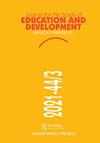Impact of group music-making on social development: a scoping review (El impacto de la práctica musical grupal en el desarrollo social: una revisión exploratoria)
IF 1.8
4区 教育学
Q4 PSYCHOLOGY, DEVELOPMENTAL
Journal for the Study of Education and Development
Pub Date : 2023-04-03
DOI:10.1080/02103702.2023.2173384
引用次数: 0
Abstract
ABSTRACT The potential of music-making to foster an individual’s social development has been widely explored. The objective of this review is twofold: (1) to examine the characteristics of group music-making initiatives aimed at promoting social skills; and (2) to analyse the impact that group music-making initiatives have on people’s social development. Twenty studies were reviewed. The aspects analysed included education level, participants’ roles, participants’ academic or social backgrounds, family involvement and various organizational features such as number of participants, duration of the programme, number of sessions per week and session length. Regarding the research methods used, the review explored the studies’ research design, the variables analysed and the impact of the results. The results were generally positive: 79% of the qualitative studies revealed notable improvements in social skills. The average effect size for the quantitative studies ranged from large to very large. Despite these promising results, the effects of group music-making initiatives are variable. It is necessary to ensure proper implementation of the initiatives or adequate conditions to foster people’s social development.群体音乐制作对社会发展的影响:一项探索性综述
音乐创作促进个人社会发展的潜力已被广泛探索。本综述的目的有两个:(1)研究旨在提高社交技能的团体音乐创作活动的特征;(2)分析群体音乐创作对人们社会发展的影响。回顾了20项研究。分析的方面包括受教育程度、参加者的角色、参加者的学术或社会背景、家庭参与情况和各种组织特点,例如参加者人数、方案的持续时间、每周的会议次数和会议长度。在研究方法方面,本综述探讨了研究的研究设计、分析的变量和结果的影响。结果总体上是积极的:79%的定性研究显示社交技能有显著提高。定量研究的平均效应大小从大到非常大不等。尽管这些有希望的结果,团体音乐创作的影响是可变的。要确保各项倡议得到适当落实,为促进人民社会发展创造充分条件。
本文章由计算机程序翻译,如有差异,请以英文原文为准。
求助全文
约1分钟内获得全文
求助全文

 求助内容:
求助内容: 应助结果提醒方式:
应助结果提醒方式:


